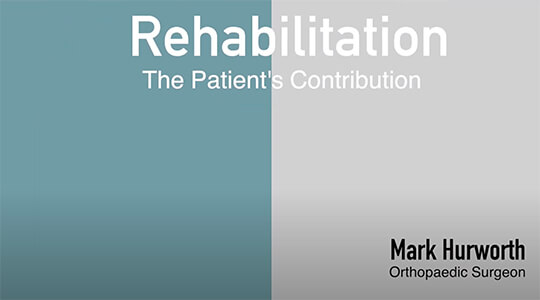Workers’ compensation
Orthopaedic surgery and workers’ compensation
If you are injured at work, then you may need to learn to navigate the Workers’ Compensation system in Australia. It’s not for the fainthearted -you will need help- but it’s useful not to lose sight of the fact that if you have a genuine injury the system is generous and designed to help you get back to work. Let’s go over some of the things to be aware of.

My orthopaedic practice in a nutshell
Workers’ compensation for orthopaedic surgery
How does it work?
If you have been injured at work and need to see an orthopaedic surgeon, it will normally become a workers’ compensation claim. Australia has a generous workers’ compensation systems for genuine work-related injuries, covering medical treatment/surgery, losses in wages or income, and costs of rehabilitation and allied health fees, but like all insurance systems it has its own bureaucracy, frustrations and pitfalls.
Why is this relevant for you? It is important to get things assessed and documented properly from the start. The system processes can be frustrating if you feel that you are being kept waiting or that your voice is not being heard.
As an orthopaedic surgery practice, our role in this process is often pivotal because many injuries sustained at work are musculoskeletal.
The workers’ compensation system
Your surgeon, your choice
Because it is easy to get lost in the workers’ compensation system, it helps to find a surgeon who is familiar with the problems that can arise.
The main problem I see from a surgical perspective is overtreatment. We are talking about unnecessary, ineffective, repetitive or premature treatment. Any healthcare professional involved in your care should have the ethical fortitude not to do this, but unfortunately this is not always the case.

Dr Mark Hurworth, Orthopaedic surgeon Perth
“Let’s talk about the pitfalls. There are plenty of potential problems, both medical and legal, that may result in you going down the rabbit hole. A rabbit hole that does not involve getting better. I believe that you need to maintain your independence, judgment and dignity and that is why I ask some hard questions at the start.”
A problem that surgeons sometimes see is patients who seem not to want to get better and who may be trying to game the system for their own advantage. Most don’t consciously start there, but some end up there. Orthopaedic surgery relies heavily on a motivated patient, as patient agency (effort and compliance) makes a bigger difference in this area than others. If you are not interested in getting better, then it might be best not to have the surgery and to settle your claim without surgery. If you have become cynical, tired of the system or addicted to painkillers (think opiates like Palexia / Tapentadol), we will need to discuss it, as surgery in this area is unlikely to help you if you lack the motivation to get better.
I need to be sure that every patient I treat is actually interested in getting better before we go on this journey. I have no interest in going down the rabbit hole with you, only in getting you out!
Story continues below video gallery
Related videos
Making a workers’ compensation claim
About medical bills, claim numbers and the insurance
A few aspects about surgery and your workers’ compensation claim:
- If you have already lodged your claim number before you plan your surgery, then your costs will be covered by the insurer if liability is accepted. If there is a dispute about what caused your injury, then there may be delays in surgery. Generally, if there is a clear injury that is documented, there is no dispute.
- This is still a typical private healthcare situation. You maintain your independence of choice as a patient i.e. you can choose your surgeon (as long as the surgeon is happy to treat you of course – some surgeons don’t do this surgery at all).
- The WC system operates independently of Medicare. You don’t need a GP referral but we would strongly advise you to get a trusted GP involved early in your care.
- We always need to go through the insurer for permission to proceed with your surgery, as they are paying. To do this, the insurer has to agree that the injury happened at work and that the recommended treatment is reasonable.
- If your treatment is significant and non-urgent, the insurer will almost always request a second opinion from a trusted source. This is to avoid any suggestions after the event that the wrong decision was made, or if perhaps (as is often the case) the diagnosis is a bit unclear. For example, a degenerative meniscal tear leading to knee replacement, i.e. a rather trivial injury can sometimes lead to significant surgery due to an aggravation of an underlying condition.

Dr Mark Hurworth, Orthopaedic surgeon Perth

Support with workers’ compensation
How do I get back to work?
It’s pretty clear that the longer you stay off work -and in the workers’ compensation system- the less chance you have of getting back to work. We are always happy to help people who genuinely want to get back to work, with optimal and timely treatment, and innovative techniques for home and remote rehabilitation that we are pioneering at present.
If your injury is complex, for instance involving multiple body parts, then the system can get overwhelming pretty quickly. Generally, it is worth involving vocational rehabilitation teams early on if the situation is complex. They will act as an intermediary between you and the insurer. My main piece of advice to you as a patient is to maintain your independent judgment and avoid addictive medication.
Don’t get overwhelmed by medical advice, don’t allow overtreatment to obscure your goals of getting better. If you feel that you are just being treated as a source of income, change providers. Always ask for another opinion if you are not happy or feel you are being forced into a particular form of treatment.
Workers’ compensation and overtreatment
A final word about workers’ compensation
The system has its weaknesses as mentioned – human nature always finds a way to express itself:
- On the patient’s side – “perverse incentive”. In the back of your mind, you may become convinced that you may get more out of the system if you don’t get better. You have to decide if this is really where you want to end up, as if you go down this path, there are always consequences further down the road.
- On the clinicians’ side the same incentives are also at work for those who are unrestrained by ethical considerations. Over my career, I have seen every form of poor or overtreatment, although occasionally I admit I am surprised by new forms of unnecessary, ineffective, repetitive, or premature treatment. Be cautious with who you choose as your surgeon, GP and physiotherapist. Always ask questions: what are the alternatives, what are the risks, how long is recovery, what are my chances of full recovery etc.
- A particular risk for you as a patient is opiate or other medically prescribed addictions. This is about starting on medications and never getting off them because they are addictive. Beware, there is evidence that after more than a few weeks, opiate medication such as Tapentadol (Palexia) makes your pain worse, not better! Never start it without a clear plan to come off it again.
- If you are in an unhappy workplace, or you feel that your injury may have been caused by someone else’s negligence, then you need to put that out in the open early, as this has real implications for timing of treatment and who we communicate with.
In summary, always maintain your judgment and decision-making clarity. Don’t become passive in this system, but work out clear, achievable goals. If you want to get better, we can help you, but if you aren’t motivated to get better, then my practice is not the right place for you.
Those are just my two cents worth after working in this area for a few decades. If you still have questions about your own situation or your work injury, don’t hesitate to call my friendly reception team to book an appointment.


